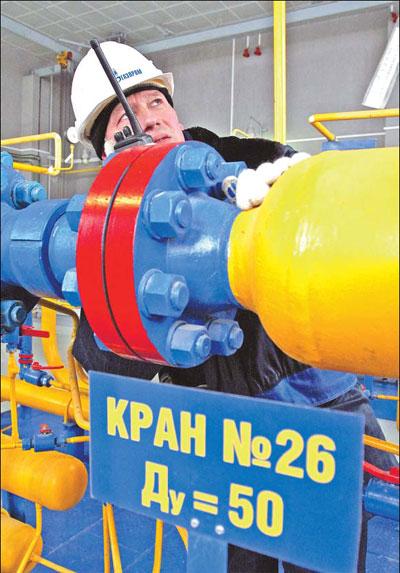
An employee at the OAO Gazprom gas compressor facility in Volokolamsk, Russia. China and Russia failed to finalize a deal on pipeline gas supplies last week due to a disagreement over the price. [China Daily via agencies]
Despite China and Russia's failure last week to finalize a deal on pipeline gas supplies, officials and experts on both sides remain optimistic.
Valery Yazev, president of the Russian Gas Association and deputy chairman of the State Duma of Russia, said it's natural to take extra time to coordinate such a huge deal, which is equivalent to about 2 percent of Russia's GDP.
"If the price can be settled in 2011, Russia is likely to start supplying China with gas by pipeline from 2015," he said at a news briefing on Monday, speaking through an interpreter.
A disagreement over the price has hindered completion of the deal. China National Petroleum Corp offered to pay $235 for each thousand cubic meters (cu m) but Russia's OAO Gazprom wants $350 for each thousand cu m.
"Gazprom is focused on achieving a price agreement in line with that of its long-term, oil-indexed contracts for pipeline supplies to its European customers," said Andrew Neff, an analyst who specializes in Russia and the Commonwealth of Independent States at IHS Global Insight.
Pang Changwei, director of the institute for international oil politics at China University of Petroleum in Beijing, said it's unrealistic to base the price on the European market because the distance between China and Russia is much less than that between Russia and western Europe, so transportation costs, a major part of the company's expenditure, are likely to be lower.
China has raised its offer from one made previously by taking into account the weak dollar and surging demand for natural gas caused by the March 11 earthquake and ensuing nuclear crisis in Japan, he said.
The offered $235 is higher than the costs of importing liquefied natural gas (LNG) and developing coal-bed methane in China, which is regarded as a benchmark for importing natural gas from Russia, said Pang.
"For Russia, the urgent priority is to penetrate the Chinese market as soon as possible. It will miss out on the market if it cannot successfully enter it in the next 10 years, as there are also many alternatives," he said.
Meanwhile, China will increase cooperation with the United States on shale-gas resources, and is also developing coal-bed methane and importing LNG from overseas countries.
"China is a reliable partner for Russia. Energy authorities from both nations need to exchange views on the supply and importation capability, thus reducing the risks in other markets," said Pang.
He said both sides should be more flexible in negotiations and that the authorities could also consider other measures, such as cutting energy-related taxes.
Bargaining between the two sides is natural, and bilateral energy cooperation still presents plenty of good opportunities, said Zhang Jing, a professor at the Euro-Asian Social Development Research Institute under the Development Research Center of the State Council.
Compared with the price charged internationally, the gas price in China is low, Zhang said. She added that the price demanded by Gazprom could cause a surge in domestic prices and further fuel inflation, which is something the Chinese government is unwilling to accept.
"China's low natural gas price needs to be connected with the international level but it will take time, and there should be no rush," Zhang said.
China's National Development and Reform Commission (NDRC) recently said the country will reform the pricing system for oil and natural gas within the year. The price of natural gas is too low when compared with other energies, an NRDC official said earlier this month.





